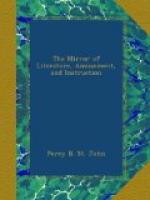The letter says, “When Sir Thomas Moyle built Eastwell House, near London, about the year, 1544, he observed his chief bricklayer, whenever he left off work, retired with a book. Sir Thomas had curiosity to know what book the man read, but was some time before he could discover it; he still putting the book up if any one came toward him. However, at last Sir Thomas surprised him, and snatched the book from him, and looking into it found it to be Latin. He then examined him, and finding he pretty well understood that language, he inquired how he came by his learning. Hereupon the man told him, as he had beer, a good master to him, he would venture to trust him with a secret he had never before revealed to any one. He then related the above story. Sir Thomas said, ’You are now old, and almost past your labour; I will give you the running of my kitchen as long as you live.’ He answered, ’Sir, you have a numerous family; I have been used to live retired, give me leave to build a house of one room for myself in such a field, and there, with your good leave, I will live and die.’ Sir Thomas granted his request, he built his house, and there continued to his death. Richard Plantagenet was buried the 22nd day of December, anno ut supra ex registro de Eastwell sub 1550. This is all the register mentions of him, so that we cannot say whether he was buried in the church or church-yard; nor is there now any other memorial of him except the tradition in the family, and some little marks where his house stood. This story my late Lord Heneage, earl of Winchelsea, told me in the year 1720.” Thus lived and died, in low and poor obscurity, the only remaining son of Richard III!
Tale of a Modern Genius.
* * * * *
FINE ARTS.
* * * * *
ART OF MOSAIC.




